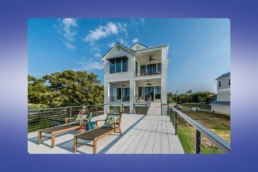Does Homeowners Insurance Cover Vacation Rentals?
Natural disasters strike at a moment’s notice, and 90% of the time, they cause flood damage. However, flooding isn’t the only type of damage you can encounter.
Hail, wind, and fire can also damage property, and these elements have no bias. They’ll strike anyone, anything, and anywhere.
People who own homes purchase homeowners insurance to minimize their risks and protect their properties. But is homeowners insurance the right choice for your vacation rentals?
If you want to protect your rental properties from perils like these, you’ll need a special type of home insurance. Insurance agents call this rental property insurance, or landlord insurance.
Are you ready to learn more about it? Read on for a guide that explains the coverage type you need and how it works.
Traditional Homeowners Insurance Is for Your Primary Residence
When you own a home, you can purchase insurance for homeowners. Insurance companies call this homeowners insurance, and it’s a product designed to cover houses. But it’s not the right product for all homes.
The most crucial fact about homeowners insurance is that it’s for your primary residence. It’s not designed for a second home, such as a vacation home or a property you rent to someone.
Your homeowners insurance policy covers your home’s structure and your belongings. It also provides liability coverage on your property.
When you buy the policy for your primary residence, an insurance company bases your rates on the risk levels. When you live in a home, the house has fewer risks than a home you use as a second home or rental property.
Therefore, a traditional homeowners policy is not the right plan type for vacation properties you own. Instead, you’ll need a policy designed for rentals.
Vacation Properties Require Rental Home Insurance
Owning vacation properties is a great way to earn revenue, but these properties present different risks to insurance companies. Therefore, insurance companies offer other policies that protect vacation rentals.
A rental property insurance policy is the coverage you need for properties you own and rent to people. Some insurance companies call this landlord insurance. It’s important to know that several distinct differences exist between landlord insurance and traditional homeowners insurance.
One difference is the risks between these two property types. Rental properties have increased risks to insurance companies, and here are some of the additional risks:
Vacant Homes Increase Risks of Damage
Vacation homes don’t always have guests or tenants, which means they’re often vacant. A vacant home tends to have an increased risk of damages, and insurance companies know this and factor it into the rates.
Burglars might notice when no one is in these homes, and they might break into them.
Tenants and Guests Might Not Care for the Properties
Tenants and guests who rent properties won’t care for them like the person who owns them. When you own a house, you have an investment in it. The result is that you tend to care more for it.
Increased Liability Issues
Renting a home to someone increases the liability risks at the property. Your guests might be more prone to injuries on the properties, potentially resulting in lawsuits.
Rental Homeowners Doesn’t Cover All Perils
Vacation rental insurance tends to cost more than traditional homeowners insurance, but it might not be the only insurance coverage you need for your rentals.
Like with homeowners insurance, vacation rental insurance doesn’t cover every peril. Most policies cover the standard perils that pose the highest threats to properties, including the following:
- Wind
- Hail
- Fire
- Water damage
If any of these perils strike your properties, they can cause major damages. However, you can file a claim for compensation with the right insurance coverage.
However, if a non-covered peril strikes your property, you won’t have this option. For example, if a flood damages or destroys your rentals, your policy won’t cover the damages.
As a result, it’s always a wise idea to purchase flood insurance if you have any risk of a flood damaging your properties. You can add a flood insurance policy to your current policy to cover this risk.
Additionally, you might need other coverage types. For example, is there a risk of your sewer line causing damage? If so, you could add sewer line coverage.
You can talk to an agent to learn about other options, too.
Why You Need to Purchase the Right Coverage
Finally, you might wonder why it’s important to purchase the right insurance coverage. Here are a few reasons:
The Wrong Policy Won’t Provide the Coverage You Need
The first thing to know is that the wrong insurance policy won’t offer the coverage you need when a disaster strikes. For example, if you have traditional home insurance, it won’t cover the damages to your rentals.
Insurance Minimizes Your Risks
Insurance coverage is the only product you can buy to minimize your risks when perils strike. If you don’t have a policy, you’ll have higher risks of encountering substantial repair bills if a peril damages your properties.
Lenders Require Insurance
If you have loans on your properties, your lenders require the proper insurance coverage. You can ask an insurance agency about these requirements if you have questions.
Protect Yourself Through the Right Home Insurance Policies
Buying homeowners insurance for your primary residence protects you, but you must ensure you have the right coverage for your vacation properties. Suffering losses is much easier with insurance coverage.
If you’re interested in learning more about protecting your vacation rentals with insurance, contact us at Central New Jersey Insurance Associates. We can help you get the coverage you need to minimize your risks.
